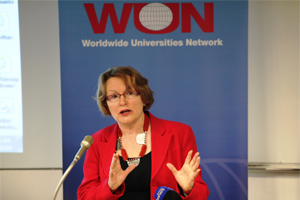Quadruple disease burden under the microscope
03 January 2014 | Story by Newsroom
South Africa is facing an unprecedented public health challenge.
Rapidly changing disease patterns, due to epidemiological and demographic changes over a relatively short time, have resulted in the oft-mentioned quadruple disease burden, said participants at a colloquium hosted at UCT, under the auspices of the World Universities Network (WUN) in November.
In addition, changing patterns of population health have created the increasingly common co-existence of multiple infectious and non-communicable disease morbidities within an individual, which is occurring in younger age groups compared to developed countries.
These were among the concerns discussed by researchers from a number of institutions who shared their experiences and insights during the colloquium which addressed one of the WUN's four key areas of interest: public health.
Entitled Understanding the epidemiological overlap and health system implications between infectious and non-communicable diseases in low- and middle-income countries, the colloquium explored a host of topics, including the risk factors and health determinants shared by infectious and non-communicable diseases, policy priorities and neglected research areas.
"The WUN was established to bring together a group of peer universities '“ universities that roughly have the same focus '“ so research is really central to their identity," said Dr Max Price, Vice-Chancellor of UCT, in opening the colloquium. "Secondly, they are universities that are comprehensive, so they cover many faculties and a wide range of interests rather than specialised; thirdly, they are committed to addressing some of the big challenges that the world faces and believe that these challenges can best be addressed through collaboration across continents, across countries, across institutions and across universities."
Conference organisers and UCT academics, Dr Tolullah Oni and Professor Naomi Levitt, said in a statement that the unprecedented public health challenge called for a new understanding of epidemiological changes, including temporal trends in disease patterns and a re-thinking of models of healthcare delivery for chronic diseases. "The implementation of the National Health Insurance scheme represents an opportunity to re-examine the current vertical chronic disease specific health system model. We propose a paradigm shift that takes into account disease interactions, health provider and patient perspectives informing health system priorities for healthcare delivery," they said.
Also present at the opening was Western Cape Premier, Helen Zille.
"The most difficult thing for me is the health budget," said Zille. "First of all, it is huge. It is bigger than the education budget, which I believe is wrong in our country based on our level of development and the challenges that we face. Not that I believe it's wrong to spend a huge amount on health '“ and we do '“ but it is because we are spending most of our money on conditions that are entirely preventable.
"Those span the non-communicable and the infectious diseases."
The colloquium was "crucial" for her to attend, she said.
She said that difficult choices had to be made and this necessitated some "really difficult trade-offs".
"Nowhere are those trade-offs more difficult than in health, because in the so-called lifestyle diseases '“ very narrowly-defined '“ like obesity, hypertension, Type 2 diabetes, we have 25% of the burden of disease. If you define lifestyle diseases more broadly to include alcohol abuse and HIV/AIDS transmission, it shoots up much higher.
"And these are very complex issues because, in the medical research that I have read, people tend to only focus on the dietary side and the exercise side when dealing with the non-communicable lifestyle diseases, and shirk away from the sexually-transmitted diseases and problems of addiction.
"When you look at the extent of coercive sex in our society, and when you look at the impact of inter-generational coercive sex, you can see how many women do not have a choice."
How we change those behaviours over time, said Zille, would be key to stemming the tide of "our huge burden of disease".
Text: Yusuf Omar. Image: Michael Hammond.
 This work is licensed under a Creative Commons Attribution-NoDerivatives 4.0 International License.
This work is licensed under a Creative Commons Attribution-NoDerivatives 4.0 International License.
Please view the republishing articles page for more information.










